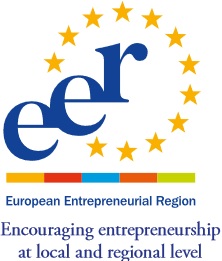 newsitems
newsitems  4,5 Centuries after 1st European Army Victory EU Leaders Awoke +Fund Modern High-Tech Defence Tools
4,5 Centuries after 1st European Army Victory EU Leaders Awoke +Fund Modern High-Tech Defence Tools
4,5 Centuries after 1st European Army Victory EU Leaders Awoke +Fund Modern High-Tech Defence Tools
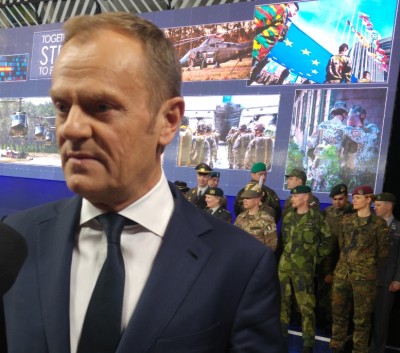
*Brussels/EU Summit/Angelo Marcopolo/- EU President Tusk's preliminary Observation (atToday's PESCO Event during this EU Summit) that, in the Past, "European Defence" had been, for too long, just an "Idea", and/or "a Dream", "revisited Many Times", "but", most often, to "no effect", because, then, it was "at odds with reality", is largely True, (considering, f.ex., the Attempts notoriously made during the "Cold War" of the 1950's, which had failed, as well as some more Recent Moves, etc).
However, by breaking New Ground in Modern Times, for the Development of a joint European Defence/Security Policy, this December 2017 EU Heads of State/Government Summit, (which Welcomed the move by an Exceptional "PESCO" Event, in Good Mood, this Afternoon: See relevant PHOTOS by "Eurofora" from the spot), it celebrated Not Just the "BirthDay" of a New Baby, but, in fact, also the "Anniversary" of a longer Historic trend for European People to succesfully Unite, all Together, ready to Fight in order to Safeguard Europe's Freedom from Foreign Attacks, which had already been Marked by the 1st Victory of a European Army almost ...4,5 Centuries earlier (See Infra) !
Indeed, Europe's History is very much Longer than usually thought, and proves that Europeans had already Succeeded to Forge an Efficient Joint Defence, during some Exceptionally Crucial Periods of Time in the Past :
In fact, it Emerged since the 16th-17th Century, (after the "ReNaissance"), between the Famous Victories of a PanEuropean Coalition, at First in the Sea, with the Naval Battle of Lepante on 1.571, (reply to an Ottoman-Turkish massacre in Cyprus) which ensured Europeans' role in the Mediterranean Sea, and afterwards on solid Ground, with the 1.683 Battle defending Austria's Capital city of Vienna, immediately followed by those which Liberated all Budapest at 1.686, and finally the entire Hungary on 1.699, from the declining Military Invasion of the Turkish-Ottoman Empire, vigorously pushed away by a Large Alliance of various Europeans United Together, (English, German, Polish, Lithuanians, Italians, French, Austrian, Hungarian, Spanish, etc, who were soon Joined also by Russians, etc).
This gave an Historic Opportunity for Europe to realize various Scientific/Technological and Political/Democratic Tansformations and Advances, as well as to Boost Personal Contacts throughout the Liberated Continent, during the Next, 18th Century, that of the "Enlightnement".
A Previous Attempt, on the 15th Century, had been Initially Succesfull, (with several Victories across South-Eastern Europe, up to -and including- Belgrade's defence on 1.456), but suddenly Vanished, soon after an Internal Social Conflict among Europeans (reportedly Divided between Landlords and Peasants), which was exploited by Ottomans-Turks in order to Invade and Occupy South-Eastern Europe.
However, another, more recent, Victory of Europeans' Armies United Together was also that of Navarino's Naval Battle, in Greece on 1.827, where French and British Admirals Fought Together with Russians, against oppressive remnants of the declining Turkish-Ottoman Empire, (which was definitively Defeated by the Europeans up to the 1.919 Peace Treaty of Sevres, concluded near Paris: See: ...).
A kind of "Embryo", or Preliminary, Draft Design of what became afterwards a fully-fledged European Defence, may be found, since much Earlier : Also at the Strong and Efficient Resistance that the Greek Cities-States (for the 1st Time United Together) notoriously opposed to the big Asian Persian Empire's repeated attempts to Invade and Occupy all "Europe", already several Centuries BC.: Indeed, the Historic, World Famous Self-Sacrifice of Leonidas' "300" Guardians of Thermopylae, followed by the Victories at the Battles of Salamina in the Sea, and Plateae up to Byzantium (later: Constantinople, now Istanbul) at the Land, (- 480, -479 and - 478 B.C., respectively), have a Similar Pattern of Independent, Sovereign Entities in Europe (then = City-States, now = Nation-States) coming Together in order to Defend themselves vis a vis a Foreign common Enemy coming from another Continent, and threatening or attacking them.
But even long Before that, an Initial Grouping of almost All City-States throughout the entire Greek Culture Area, had send Fighters for a Common Battle won against Troy, (on the -12th Century BC, notoriously described at Omer's Illiad and Odyssey, parts of which remain as published from -800/-700 BC), in order to keep Open the way from the Aegean Sea up to the Black Sea's Northern Coasts producing Wheat. (I.e. what became much Later-on, the "Road from the Greeks to the Swedish", resulting to the creation of Russia from +800/+900 AC).
-----------------------------------------------
=> All these Historic Periods of various European Armies' Victorious groupings, had been Preceded by an Era of Cultural raprochment/unification, (as, f.ex., the "European Renaissance" period of the +16th or +17th Century AC, the Spread of Greek Language and Olympic Games' traditions in Ancient Greece, etc), Provoked by the Need to Face an imminent Foreign Threat or Attack, (f.ex. the "Persian Wars" in Ancient Greece, or the "Ottoman-Turk Empire"'s Invasions/Occupations up to the +17th Century AC),
and Followed by an Era of Peace and Scientific/Technological Progress, (f.ex., +18th Century AC of "Enlightnement", and/or, already Previously, the -5th and -4th Centuries BC in Greek Philosophy/Democracy, etc).
------------------------
After a Failure of the Political Unification process which had been launched with the CoE from 1949, withOut succeeding to boost a European Defence back on 1954, Europe's U-Turn towards Schuman's ideas, which privilegied Economic Infrastructures, with the Treaties of Rome (1957) on what became afterwards the EU, starts, Nowadays, (December 2017), to Boost a European Security and Defence Policy, by developing First its Economic Basis :
By the creation of a European "Defence Fund", and adopting "in 2018" an equivalent "Industrial Development Programme", "in Time to Finance the first Capability Projects in 2019", following the Establishment of a "Reinforced Cooperation" mechanism including 25 EU Member States on this December 2017, (etc).
=> Among almost 20 PESCO Projects, officially presented Now in Brussels, are Both various Operational Tools, and Capacity-Building Mechanisms, as well as Logistic Instruments, and Communication/Command-Control, Organisational Systems, etc.:
(A) F.ex., amidst various 3C - Organisation Systems' Projects, are also some for :
* Europêan Military Radios, including Secure Software, Inter-Operability, Voice and Data Communications, Variety of Platforms (as Handheld, Portable and Vehicle-Mounted Devices, etc).
* Surveillance and Protection of Harbours and Maritime areas, with Sensors, Software, Communications and Platforms (surface, underwater and aerial Vehicles), is another Integrated System, able to deliver also a Command-Control function.
* A Strategic Command and Control System, which Connects users by Information and Decision-making support tools, improves Planning, Conduct and Coordination. Integrates Intelligence, Surveillance, Command and Control, and Logistics.
(B) Some concrete Examples of Operational Tools' projects are:
* A New prototype of Armoured Vehicle, Both for Infantry Fighting, and Amphibious Assault, as well as in a Light Version. Supporting Fast Deployment, Reconnaissance, Combat and Logistics or Medical supports, Command and Control. Based on a Common Support, and easing Inter-Operability among European Armies.
* An Artillery with Mobile Precision and indirect Fire supports, including Battle decisive and Non-Lethal Ammunitions, as well as Fire Control, for Land Forces, in the Short-Mid Term.
* The Maritime, semi-Autonomous system for Mine CounterMeasures, with a "Mix" of UnderWater, Surface, and Aerial Technologies, enabling to Protect Maritime Vessels, Harhours, and Off-Shore installations, while also SafeGuarding Freedom of Navigaton on Maritime Trading Routes. It includes UnderWater Autonomous Vehicles, Cutting-Edge Technologies, an Open Architecture and a Modular set-up.
* Rapid Reponse Teams, and/or an Information-sharing Platform to Respond to Cyber-Threats : CRRTeams Assist in Operations, Diagnostics, Forensics and Training. While the ISPlatform moves from FireWalls to Active Measures, also by Sharing Intelligence through a Member States' Network. CRRTs are Equiped with Deployable Cyber ToolKits, to Detect, Recognize and Mitigate Threats.
(C) On Logistics :
* f.ex., a Network of Hubs and Support to Operations, via Cross-Border Solutions, (for Seamless Transport/Logistics and Connection of Existing EU Initiatives, under 1 Umbrella). to Enhance Planning and Movement, as well as deliver Common Standards and Procedures.
* an "Energy Operational Function" project for a Dual Aim : (a) New Systems of Energy Supply for Camps deployed in Joint Operations, or for Soldier-connected Devices/Equipments. And (b), take Energy into Account, from the Conception of Combat Systems, to Implementation of Support in Operations, Planning included.
(D) on Capabilities+ :
* a Military Mobility project, to Simplify Cross-Border Transport Proedures, in order to Enhance Speed of Movement of Military Forces accross Europe : UnHindered Movement of Personel and Assets, avoidance of Bureaucracy (as Passport Checks), Reduction of Barriers (incl; Legal+) and/or Infrastructure Problems (as Roads, Bridges able to accomodate Large Vehicles).
* a Competence Center for Training, to improve the Availability, InterOperability, Skills and Professionalism of staff, as well as Accelerate EU Training Missions, by Educated, Trained and Available Personnel.
* an EU Medical Command, with Enduring Capability to support Missions and Operations on the ground, by providing, f.ex. a MultiNational and Rapidly Deployable Force, Evacuation Facilities, Triage and ReSuscitation, Treatment and Holding of Patients until they Return to duty, Emergency Dental treatment, etc., as well as by Ensuring Efficient Joint EU Management, Planning and Coordination on Scarce Medical Services, offering Critical Resources, Harmonizing Standards, Legal (civil) Framework and Sanitary Principles. For greater InterOperability and Coherence of Health Care Capabilities in Europe, (Standardization of Concepts, Training and Certification).
* UpGrade Maritime Surveillance, by Integrating Land-Based systems, Sea and Air Platforms, for Real-Time Information to EU Member States, facilitating Timely and Effective Response in International Waters. So as to Better Protect the EU and its Citizens, by easing Address of New and Old Threats and Challenges, (f.ex. Energy Security, Environment, Defence and Security, etc). Through Enhanced Awareness and Response Effectiveness, by Infrastructure Use, Assets' Deployment, and Capabilities' Development.
-----------------------------------
=> In its Conclusions, this December 2017 EU Brussels' Summit Welcomed the launch of the Permanent Structured Cooperation (PESCO) on Defence, and Decided to adopt on 2018 an EU Defence Industry Program for Funds to Projects from 2019, and in order to Complete the Reform of EU's Funds for Common Costs of EU Military Missions/Operations, as well as work on a New Instrument for Capacity Building in Security and Development from 2020.
EU Leaders also decided to respect the relevant Commitments taken by the NATO since December 2017.
- "For many years, the strongest argument against (EU's) PESCO had been the fear that it would lead to the weakening of NATO. But (in fact, now) it is quite the opposite: Strong European defence naturally strengthens NATO. This is why PESCO is not only good news for us, but it is also good news for our allies...", EU President Tusk observed at the event on PESCO.
-----------
+Meanwhile, the President of ChristianDemocrat/EPP party, Joseph Daul, an Experienced former Long-Time Leading MEP at EU Parliament, from Strasbourg, spoke Today in Brussels, after Chairing a Meeting of EPP Heads of State/Government here, about what he Optimistically called as "a New Era" of "European Defence" :
- "As Europeans are expecting us to provide a Secure Europe, the EPP has made a Priority for PESCO to become a Reality", stressed Daul.
-------------------
***
Main Menu
Home Press Deontology/Ethics 2009 Innovation Year EU endorses EuroFora's idea Multi-Lingual FORUM Subscribers/Donors FAQs Advanced search EuroFora supports Seabird newsitems In Brief European Headquarters' MAPs CoE Journalists Protection PlatformBRIEF NEWS
- 00:00 - 02.06.2021
- 00:00 - 18.10.2020
- 00:00 - 19.06.2020
- 00:00 - 18.05.2020
- 00:00 - 20.04.2020
- 00:00 - 02.02.2020
- 00:00 - 09.12.2019
- 00:00 - 27.11.2019
- 00:00 - 16.11.2019
Popular
- Yes, we could have prevented Ferguson riots says World Democracy Forum's Young American NGO to ERFRA
- Spanish People Elect CenterRIGHT Majority with 1st Party and Total of 178 MPs (6 More than the Left)
- Pflimlin's vision
- The European Athletic "Dream Team", after Barcelona 2010 Sport Championship Results
- Source Conseil d'Europe à ERFRA: Debatre Liberté d'Opposants à Loi livrant Mariage+Enfants à Homos ?
- Head of BioEthics InterGroup, MEP Peter Liese : "Embryonic stem cell research reaching its END" !?
- Spain: Jailed Turkish Terror suspect with Explosive,Drones,Chechen accomplices stirs Merah+ Burgas ?
- UN Head Ban Ki Moon at CoE World Democracy Forum : - "Listen to the People !"
Latest News
- EUOmbudsmen Conference 2022: Digital Gaps affect People's Trust threaten EF Project on EU Future ?
- French Election : Black Out on Virus, but Obligation for Fake 'Vaccines" Challenged
- Both French Presidential Candidates point at "Humanism" in crucial times...
- France : Zemmour = Outsider may become Game Changer in Presidential + Parliamentary Elections 2022
- PACE President Cox skips Turkey Worst (Occupation) case compared to Russia (DeMilitarisation) query
Statistics
Посетителей: 56761867Archive
Login Form
Other Menu
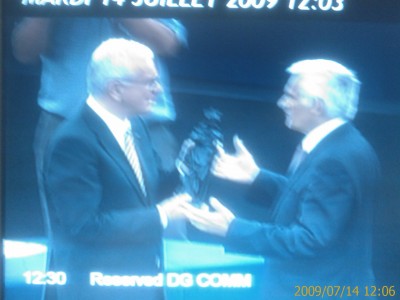
Scientific innovation joined to Faith for Human Rights, Eastern Partnership and fight against the Crisis, but above all, the need to overcome the "Crisis of Trust" from EU Citizens, are the main priorities for new EU Parliament's President, Polish Jerzy Buzek, that a 555-votes-strong majority of MEPs on July 14, Strasbourg made a living symbol of the fact that, 20 years after the fall of Berlin Wall (1989 - 2009) there is no more an Eastern or Western Europe, but only one Europe, as the head of the largest group of MEPs, ChristianDemocrats/EPP, Joseph Daul, stressed after the event.
Speaking later to a group of Strasbourg's Journalists, including "EuroFora", the new EU Parliament's President clarified his stance on concrete topical issues, as f.ex. that of Turkey's controversial EU bid, which was one of the main issues of the June 2009 Electoral campain, clearly won by his party of ChristianDemocrats/EPP : - "At present, Turkey does not fullfil none of EU conditions", he stressed, (See infra).
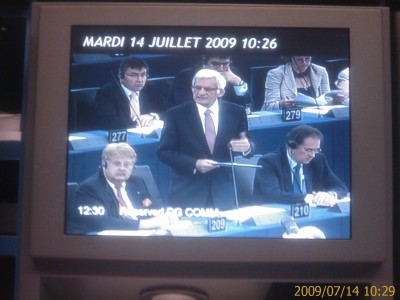
Buzek is well known in Strasbourg and to "EuroFora" as EU Rapporteur for the Framework Program of Scientific Research and Development of Technologies. A Natural Science Professor from the Historic and Religious landmark Polish City of Częstochowa, active in the famous Solidarnosk grass-roots social movement, he served 4 years as Prime Minister (1997-2001), before being elected as MEP in 2004 and 2009, after he brillantly won the latest EU Election at the head of his party (EPP) almost doubling the number of its MEPs from 15 to 28 !
- "Innovation" and "Energy safety", as well as fight against the "Cimat change", but also "Eastern Partnership", the "Mediterranean", "Strategic partnerships" with Russia, the USA, etc, and the search for "solutions to the Economic Crisis" that EU Citizens "expect" from us, will be his "priorities", announced from the outset the new EU Parliament's President, reminding also that the quest for "Human and Civic Rights" played an important role in his experience with the Solidarnosc grass-roots social movement in Poland's History
But, the most important of all, is the urgent need to overcome the "Crisis of Trust" between EU Institutions and the People he stressed : - EU "Citizens often don't understand us", denounced Buzek, launcing a call to "do anything for EU Citizens to understand our work" in EU Parliament : "We (MEPs) need to make EU Citizens involved" in "what we are doing every week, in Strasbourg and Brussels", he proposed. Pointing f.ex. to the hot "Debates" with "strong arguments" exchanged between MEPs during the preparation of their Legislative Decisions, in Committees, delivering often hard struggles between initially opposed points of view, long before forging a majority at the final vote, sometimes more than a year..
Therefore, EU Parliament will be "open to your criticism, for discussion and exchange of views", he promissed to Journalists in Strasbourg.
In this way, Buzek, in fact, highlighted "EuroFora"s main idea, that we strongly advocate since 1997-2007, to systematicaly and actively involve EU Citizens in public debates during the decision-making process of important EU measures, which affect their lives and the society in which they live, (and not only just a few weeks each 4 or 5 Years at the eve of EU Elections)...
--------------------
This is related also to the symbolic gift that Buzek chose to give to the out-going former EU Parliament's President, Hans Gert Poettering, (2007-2009), his collegue in the ChristianDemocrats/EPP, who brillantly won 2009 EU Elections in Germany : A genuine statute of sainte Barbara crafted in Silesia's black Coal by Polish Miners : Those simple but strong people who fought for social change against some technocrats and bureaucrats disguissed into so-called "real-socialists" of old times. (PHOTO).
It's enough to have seen a popular open air mass, at Warsaw's center, with many thousands of people, old and young, simple workers and intellectuals mixed together, with references to Poland's history and struggles for survival and liberty, through various ages, (as fex. that organized at the eve of CoE's 2005 panEuropean Heads of State and Government for the beatification of late Pope John-Paul II), in order to understand what such symbols mean..
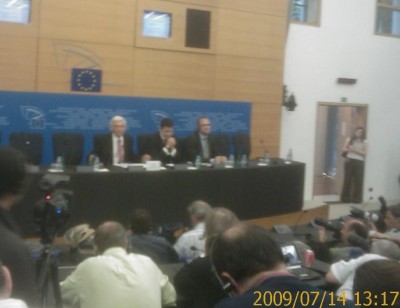
But, overcoming the "Crisis of Trust" with EU Citizens obviously implies also to rectify any errors done in the past, fex. on Turkey's controversial EU bid, with controversial decisions taken in 1999 and 2004 to give a "candidate" status and to start EU negotiations, provoking an unprecedented series of 3 "No" to EuroReferenda and 3 Majoriy Abstentions in EU Parliament Elections : 1999, 2005 and 2009, (even if the latest one succeeded to decelerate and almost stop the drop of participation rates, opening hopes for vote's revival after an electoral campaign clearly critical to Turkey's claims in several mainstream EU countries)
Therefore, Buzek was faced with manifold critical Questions on EU Enlargement, most of them citting concrete examples of certain political problems : But his replies were almost always given as a matter of general principle :
F.ex. Questioned on the suspension of EU - Croatia talks because of a Border conflict with EU Member Slovenia, Buzek prefered to speak about principles :
- "We know that during Enlargement, the process can be blocked by failure to resolve this kind of issues", This concerns also other enlargments' cases", and "these rules are always in force" he warned.
But Buzek avoided to directly reply to a queston on "French and German EPP' calls to define the Borders of Europe", as a German journalist asked him by making a reference to French President Nicolas Sarkozy, and German Chancellor Angie Merkel's, critical statements on Turkey at the June 2009 Electoral campain.
- "Concerning Enlargement, there's always the same rules : There have to be Criteria, which have to be respected if a Country wants to join the EU", he started to simply reply.
- "For my country (Poland) it took us 15 Years to fullfil these Criteria", Buzek reminded, indicating, if proportions are kept, that Turkey, fex. would have to spend some 25 years before eventually joining the EU..
- "Countries wishing to join the EU need to Change their Systems", as we (Poland and other former Eastern European Countries) did, he stressed.
- "'For me, meeting the condition of Human Rights is one of the Key conditions for membership in the EU", preferring again to speak from the point of view of General Principles, on the occasion of an untimely question on Serbia (which is not even a candidate yet)...
- "Turkey" has, "first of all", to fullfil (EU) Copenhagen criteria". Bevause, currently, none of them is fullfiled by Turkey", New EU Parliament's President, denounced, speaking later to a group of Journalists, including "EuroFora".
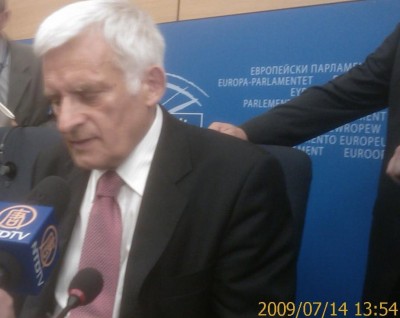
In particular, on Human Rights : - "We (EU) can never forget Human Rights", because "this is at the very Foundations of the EU", Buzek added.
On the contrary, when he referred to EU Enlargment for the "Western Balkans Countries ", Buzek appeared upbeat, finding "promising situations", despite "difficulties" in the Past, since "Countries are queuing to become EU members", and this "generated changes", as he said.
As for Russia, Buzek observed that it was a "very important" country, located "in the same Continent", Europe, "close to our borders", and "we need eachother". "But Russia' has 'differend poblems : "They claim that their system is Democratic, but rules are differend", and we must be "aware of such differencies", fex. "on Human Rights", that we can't ignore, as he said;
Concerning China, where a journalist observed that the recipient of EU Parliament's latest "Sakharov prize" for freedom of thought is "still in prison", Buzek found that since the 1999 events in Tien Amin square, "we see differencies on Human Rights still today", and expressed his "support" for those who try to ameliorate the situation.
On the contrary, speaking recently to "EuroFora" he strongly supported the idea for an EU - Ukraine cooperation, fex. between Airbus and Antonov, in order to build a less costly but more performant than the old and problematic A400M, new Military Transport Airplane : - "They (Ukranian Antonov Company) can certainly do it. I'm sure they can. It's a good Idea, and I'd be glad if it was done", he told us. (See : http://www.eurofora.net/newsflashes/news/airbusantonov.html )
Polls
SMF Recent Topics SA
- Record Hospitalisati... (0) by Breadman
- How Many Infected by... (1) by Thunderbird
- Real Cause for Europ... (0) by Breadman
- Interesting Australi... (0) by Aurora
- Plus de mRNA Faux-&q... (0) by Aurora
- EU: Lukashenko as E... (0) by WKalina
- Why NATO in Ukraine,... (0) by Geopol
- Afghanistan's key : ... (0) by Thunderbird
- Anti-Pass Demonstrat... (0) by Aurora
- Veran - Fioraso : Mê... (1) by JohnsonE













